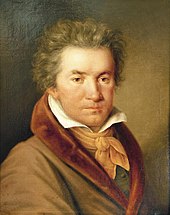1.) Ludwig van Beethoven was born in Bonn, Germany in 1770.
2.) This German composer is considered one of the greatest musicians of all time.
3.) His childhood and adolescence were difficult due to his father’s harsh discipline and alcoholism.
4.) Beethoven’s mother died when he was 18 years of age and became the head of the family, taking responsibility for his two younger brothers.
5.) When he moved to Vienna, Austria, his two younger brothers followed him.

ImageSource
6.) In Bonn, Beethoven studied with Christian Gottlob Neefe who used the music of German composer Johann Sebastian Bach as a cornerstone of instruction.
7.) He also studied briefly with Austrian composer Wolfgang Amadeus Mozart.
8.) In 1792, he made another journey to Vienna and studied with Austrian composer Joseph Haydn.
9.) Beethoven stayed in Vienna from 1792 and for the rest of his life.
10.) Early in the 1800s, Beethoven’s sense of hearing started to decline and gradually put an end to his performing career.
11.) However, Beethoven’s compositional achievements did not suffer from his hearing loss but instead gained in richness and power over the years.
12.) A woman named Antonia Brentano was probably the intended recipient of Beethoven’s famous letter to the “Immortal Beloved.” The letter dates from July 1812 and apparently marks the collapse of Beethoven’s hopes to seek happiness through marriage.
13.) He was so disappointed that during 1813 he was generally depressed and unproductive.
14.) Beethoven’s fame during his lifetime reached its peak in 1814. His 2 most famous works were Wellington’s Victory op. 91 (1813; also known as the Battle Symphony), and The Glorious Moment op. 136 (1814).
15.) During the last decade of his life Beethoven had almost completely lost his hearing, and he was increasingly socially isolated.

ImageSource
16.) He had assumed the guardianship of his nephew Karl after a lengthy legal struggle, and despite Beethoven’s affection for Karl, there was enormous friction between the two.
17.) His outstanding works between 1818 and 1826 include the Sonata in B-flat major op. 106 (Hammerklavier, 1818), the Missa Solemnis in D major op. 123 (1823), the Thirty-Three Variations on a Waltz by Diabelli in C major op. 120 (1823), the Symphony No. 9 in D minor op. 125 (1824), and his last string quartets.
18.) Beethoven is a person filled with sense of humor and often amused himself with jokes and puns when he is seriously ill.
19.) Later in his life, Beethoven contracted pneumonia.
20.) The celebrated Symphony No. 5 in C minor op. 67 from 1808 is the most thematically concentrated of Beethoven’s works.

ImageSource
21.) Beethoven’s Symphony No. 9 in D minor op. 125 (Choral, completed 1824) is perhaps the most famous work of classical music in existence.
22.) Beethoven never married and died a bachelor in 1827.
23.) Beethoven's funeral procession on 29 March 1827 was attended by an estimated 20,000 Viennese citizens.
24.) Beethoven's most important aristocratic patron was Archduke Rudolph, the youngest son of Emperor Leopold II.
25.) A movie titled Copying Beethoven was released in 2006, starring Ed Harris as Beethoven. This film was a fictionalized account of Beethoven's last days, and his struggle to produce his Ninth Symphony before he died.
